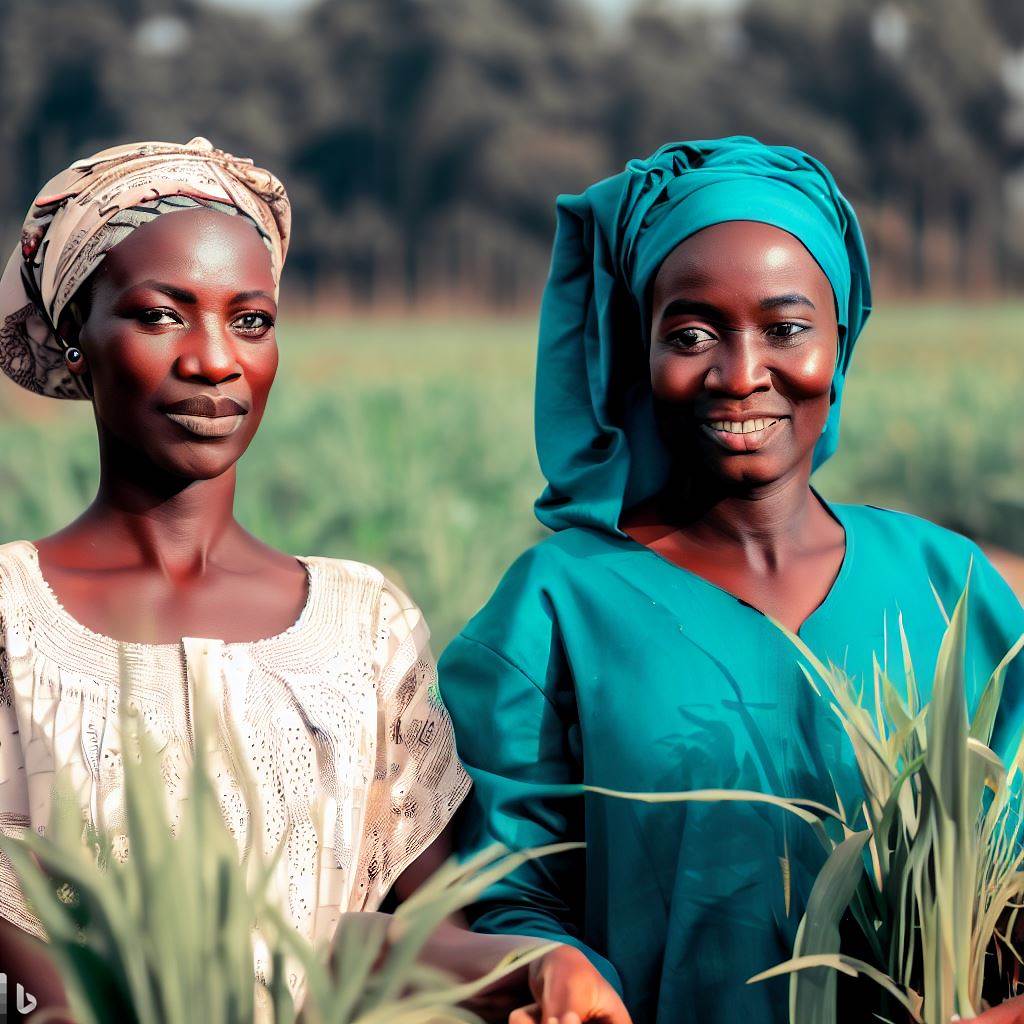Introduction
Exploring the Topic
In Nigeria, empowering women in farm management is a pressing issue that demands attention.
Significance of Women’s Participation
- Food Security: Women’s involvement ensures stable food production and distribution.
- Economic Growth: Their contribution boosts rural economies and national GDP.
- Community Development: Women’s participation leads to improved living conditions and infrastructural development.
- Gender Equality: Encouraging inclusivity dismantles gender-based barriers.
- Knowledge Preservation: Women play a vital role in passing down traditional agricultural wisdom.
In this blog post, we delve into the pivotal role of women in Nigerian farm management, recognizing its multifaceted impact.
Current Status of Women in Farm Management in Nigeria
Statistics and data on the representation of women in farm management roles
In Nigeria, women’s representation in farm management roles is significantly low, with only a small percentage occupying leadership positions.
According to recent statistics, women make up only 17% of farm managers in the country.
This underrepresentation is a clear indication of the systemic barriers and gender inequalities that exist within the agricultural sector.
Challenges faced by women in accessing and participating in farm management
Gender-based stereotypes and cultural norms
One of the major challenges faced by women in farm management is the prevalence of gender-based stereotypes and cultural norms that limit their participation.
Traditional beliefs often view women as homemakers and caretakers rather than decision-makers in agriculture.
Limited access to resources and financial support
Another significant obstacle for women in farm management is the limited access to resources and financial support.
Women often lack control over land, credit, and other essential resources needed to effectively manage farms. The scarcity of financial aid programs specifically targeted towards women exacerbates this issue.
Lack of education and skills development opportunities
Women in Nigeria also face challenges related to education and skills development.
Limited access to education and vocational training programs hinders their ability to acquire the necessary knowledge and skills for effective farm management.
This lack of education further perpetuates the cycle of gender inequality in the agricultural sector.
Basically, the current status of women in farm management in Nigeria is a stark representation of the existing gender disparities and cultural obstacles prevalent in the country.
To foster their participation, it is essential to address these challenges and create a more inclusive and supportive environment for women in the agricultural sector.
Read: Fishing Industry Jobs: Exploring Nigeria’s Marine Wealth
Benefits of Women’s Participation in Farm Management
Women’s participation in farm management in Nigeria brings numerous benefits, both in economic and socio-cultural aspects.
Economic benefits
Increase in agricultural productivity and output
Women’s involvement in farm management leads to improved production techniques and efficient resource allocation, resulting in increased agricultural productivity and overall output.
Enhanced income generation opportunities for women
By actively participating in farm management, women gain access to income-generating opportunities, such as selling agricultural produce, which helps in improving their financial well-being and economic independence.
Reduction in poverty and food insecurity
Women’s involvement in farm management contributes to poverty reduction and ensures food security by increasing agricultural production, which directly benefits the household and local communities.
Socio-cultural benefits
Empowerment and improved status of women
Women’s participation in farm management empowers them by providing decision-making roles and enhancing their social status within the community.
This enables them to actively contribute to important discussions and gain recognition for their expertise in agricultural practices.
Contribution to gender equality and social development
By fostering women’s participation in farm management, gender equality is promoted, challenging traditional gender roles and norms.
This contributes to overall social development by creating more inclusive and equitable societies.
Preservation of local knowledge and traditions
Women’s active involvement in farm management helps in preserving local knowledge and traditions related to farming practices, ensuring the transfer of valuable skills and intergenerational knowledge within communities.
This contributes to the cultural heritage and identity of the Nigerian society.
In essence, promoting the participation of women in farm management brings various benefits, including improved economic outcomes such as increased productivity, enhanced income generation, and reduced poverty and food insecurity.
Additionally, it contributes to socio-cultural development by empowering women, promoting gender equality, and preserving local knowledge and traditions.
It is crucial to recognize and support the valuable role of women in agriculture for the overall progress and sustainable development of Nigeria.
Strategies for Fostering the Participation of Women in Farm Management
Education and training
Access to formal and informal education
Women should have equal opportunities to acquire agricultural knowledge and skills through schools, universities, and vocational training programs.
Training programs should be tailored to the specific needs and challenges faced by women in farm management.
Promoting agricultural entrepreneurship among women
Women should be encouraged to start their own agricultural businesses, providing them with the necessary resources and support.
Entrepreneurial training programs can equip women with the skills to manage a farm as a successful business.
Financial support and access to resources
Microfinance programs and loans
Women farmers should have access to microfinance programs that offer small loans and financial services to support their farming activities.
These programs can help women invest in equipment, seeds, fertilizers, and other resources necessary for efficient farm management.
Land ownership and rights for women farmers
Women should have equal rights to land ownership and control, allowing them to make decisions about farm management.
Land redistribution programs can play a crucial role in ensuring gender equity in access to agricultural land.
Policy and institutional interventions
Gender-sensitive agricultural policies and programs
Governments and agricultural institutions should develop policies and programs that consider the unique challenges faced by women in farm management.
These policies should address issues such as credit access, market opportunities, and training programs specifically designed for women.
Strengthening women’s participation in decision-making bodies
Women should be included in decision-making processes at all levels, such as agricultural cooperatives, farmer associations, and government committees.
Affirmative action measures can be taken to ensure balanced representation of women in these bodies.
Supportive legal frameworks
Laws and regulations should be enacted and enforced to protect women’s rights in agriculture, including laws against gender-based discrimination and violence.
Legal frameworks should also recognize and protect women’s rights to land ownership, inheritance, and control over resources.
By implementing these strategies, Nigeria can foster the participation of women in farm management, empowering them as leaders in the agricultural sector.
Equal access to education, financial support, and resources, along with gender-sensitive policies and legal frameworks, will help create an enabling environment where women can thrive and contribute to food security and economic development.
Women’s participation in decision-making bodies will also ensure that their perspectives and needs are represented and addressed in agricultural policies and programs.
Together, these efforts will create a more inclusive and equitable agricultural sector, benefiting not only women but society as a whole.
Read: Agricultural Engineering in Nigeria: Career Prospects

Success Stories and Case Studies
Highlighting successful initiatives and projects in Nigeria
In the quest to foster women’s participation in farm management, various initiatives have been successful.
The Women in Agriculture Development (WIAD) project stands as a remarkable example of empowering women.
With funding from international organizations, the WIAD project focused on capacity building and skills development.
Training workshops were conducted on modern farming techniques, financial literacy, and leadership skills.
As a result, many women gained the knowledge and confidence to actively engage in farm management.
Another successful initiative is the Women Farmers Advancement Network (WOFAN), which started in 1993.
WOFAN provides training, access to finance, and market linkages to women farmers across Nigeria.
Through their programs, WOFAN has helped women increase their farm productivity and income.
One case study from WOFAN features Amina, a woman who transformed her small farming enterprise.
Amina participated in WOFAN’s training on improved agricultural practices and post-harvest techniques. She adopted these techniques, resulting in higher crop yields and improved profitability.
Showcasing the impact of women’s participation in farm management
The increased involvement of women in farm management has brought about numerous positive outcomes.
Firstly, women’s participation has contributed to the overall economic development of Nigeria’s agricultural sector.
According to a report by the International Food Policy Research Institute (IFPRI), when women have equal access to resources and opportunities in agriculture, productivity increases.
Women’s involvement in decision-making processes also leads to more sustainable and inclusive farming practices.
Furthermore, the participation of women in farm management has improved household food security.
Studies have shown that women who are actively engaged in farming allocate a higher portion of income to food expenditures.
This not only ensures their family’s nutritional needs are met but also contributes to reducing hunger in the community.
Moreover, women’s participation in farm management has enhanced gender equality and empowerment.
When women are economically empowered through farming, they gain more control over their own lives and decisions.
They become agents of change within their families and communities, challenging traditional gender roles.
Essentially, the success stories and case studies demonstrate the positive impact of women’s involvement in farm management.
By supporting and encouraging women’s participation, Nigeria can further unlock the potential of its agricultural sector.
Read: Promising Careers in Nigeria’s Organic Farming Sector
Challenges and Potential Solutions
Identifying remaining obstacles and barriers
In order to address the challenges and barriers that prevent the full participation of women in farm management in Nigeria, it is crucial to identify the remaining obstacles that hinder their progress.
Awareness campaigns and advocacy efforts
Gender norms and stereotypes continue to reinforce traditional roles, limiting women’s ability to become decision-makers in farm management.
By challenging these norms through awareness campaigns and promoting gender equality, women can be empowered to take on leadership roles in agriculture.
Lack of access to education and training opportunities
The lack of access to education and training opportunities acts as a significant barrier for women who wish to engage in farm management.
Providing adequate training programs and scholarships targeted specifically at women can help them acquire the necessary skills and knowledge to excel in agriculture.
Inadequate access to finance and resources
The limited access to finance and resources impedes women from starting or expanding their farming businesses. Governments and financial institutions should develop and implement inclusive financial policies that prioritize women’s access to credit, loans, and other resources.
Limited support systems and networks
The absence of strong support systems and networks specifically tailored to women in agriculture creates a disadvantage for aspiring female farm managers.
Establishing and strengthening women’s networks and support systems can provide platforms for knowledge sharing, mentorship, and mutual support, fostering the growth of women in the sector.
Discussing potential solutions and recommendations
Awareness campaigns and advocacy efforts
In terms of potential solutions and recommendations, awareness campaigns and advocacy efforts should be undertaken to challenge existing gender norms and stereotypes.
By raising awareness about the importance of women’s participation in farm management and highlighting success stories, societal perceptions can be gradually transformed.
Collaboration between government, NGOs, and private sectors
Collaboration between various stakeholders such as government agencies, NGOs, and private sectors is crucial in providing comprehensive support to women in farming.
Such collaborations can create initiatives that offer education, finance, mentorship, and access to markets, enabling women to thrive as farm managers.
Strengthening women’s networks and support systems
Efforts should be made to strengthen women’s networks and support systems. This can be achieved through the establishment of women-led organizations, forums, and mentorship programs specifically designed to empower and support women in their agricultural ventures.
In a nutshell, fostering the participation of women in farm management in Nigeria requires identifying the remaining obstacles and implementing potential solutions.
By challenging gender norms, providing access to education and resources, and strengthening support systems, we can create an enabling environment that empowers women to excel in agriculture, contributing to food security and economic development in the country.
Read: The Booming Horticulture Sector: Jobs in Nigeria
Conclusion
Recap of the importance of fostering women’s participation in farm management
Fostering the participation of women in farm management in Nigeria is crucial for sustainable agricultural development.
Women play a significant role in food production, and their involvement can lead to improved productivity, profitability, and livelihoods.
Call to action for various stakeholders
To promote gender equality and empower women in farm management, a collaborative effort is needed.
Government agencies, NGOs, farmers’ organizations, and other stakeholders should implement policies and initiatives that prioritize women’s access to resources, training, and decision-making positions.
Optimistic outlook on the future of women in Nigerian farm management
Despite the challenges women face in accessing land, finance, and markets, there is hope for progress.
The increasing recognition of women’s contributions, coupled with efforts to address gender disparities, can create an enabling environment for women to thrive in farm management.
With the right support, women can become agents of change, driving agricultural innovation and sustainable development in Nigeria.




